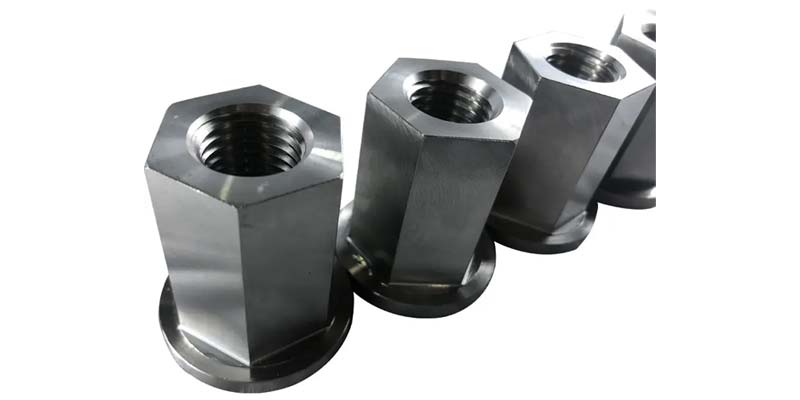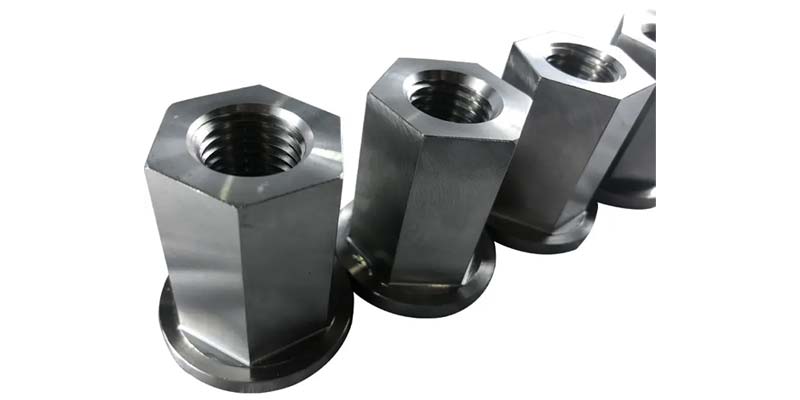- Contact Innally, Let you purchase forgings in China more favorable prices, products more assured!
- Hotline:+(86)15038323776 Email:innally@innally.com
Advantages of titanium forgings: high strength, light weight and corrosion resistance
- Category: Metal forging, Titanium alloy forging
- |
- Date: 12/09/2023
In order to give full play to the advantages of titanium alloy forgings, it is necessary to deeply explore its internal mechanism and performance evolution law, and provide theoretical support for expanding its application field. At the same time, it is also necessary to strengthen the research and improvement of production processes and equipment to improve the production efficiency and product quality of titanium alloy forgings.
Product Details
Titanium alloy is a set of high strength, light weight and corrosion resistance in one of the metal materials, widely used in various fields. Titanium alloy forging is the use of forging process to process titanium alloy material into the required shape and size of the product, with more excellent performance. This paper will discuss the advantages of titanium alloy forgings from three aspects: high strength, light weight and corrosion resistance.
First, high strength
Titanium alloy forgings have high strength and excellent mechanical properties, mainly due to their unique crystal structure and alloying element composition. Through reasonable alloy design and forging process, the strength and hardness of titanium alloy forgings can be further enhanced. Common titanium alloy forgings such as Ti-6Al-4V have excellent tensile strength, yield point and ductility, which make them have good application prospects in harsh environments such as high temperature, corrosion and high load.

In order to improve the strength of titanium alloy forgings, the following methods are usually used:
Alloying element addition: By adding a certain amount of alloying elements in titanium alloy, such as Al, V, Mo, etc., to change its crystal structure and improve the strength and hardness of the alloy.
Heat treatment: Through the appropriate heat treatment process, the internal structure of titanium alloy forgings is changed, so as to improve its mechanical properties. For example, the grain size of titanium alloys can be refined and the strength and hardness of alloys can be improved by solution treatment and aging treatment.
Cold processing: Through rolling, drawing, extrusion and other cold processing processes, the plastic deformation of titanium alloy forgings can further improve its strength and hardness.
- Light weight
Titanium alloy forgings have the characteristics of lightweight, which is due to the low density of titanium alloy. While ensuring strength, the use of titanium alloy forgings can effectively reduce the weight of products, which is of great significance for aerospace, automobile manufacturing and other fields. For example, in the aerospace field, the use of titanium alloy forgings to manufacture aircraft parts can reduce the weight of the fuselage and improve flight efficiency.
In order to achieve the light weight of titanium alloy forging, it is necessary to select the appropriate titanium alloy material and carry out fine heat treatment process. In terms of material selection, titanium alloys with lower density are usually selected, such as Ti-6Al-4V, Ti-5Al-2.5Sn, etc. In the aspect of heat treatment, titanium alloy forgings with excellent comprehensive properties can be obtained by controlling the heating rate, holding time and cooling rate.
Three, corrosion resistance
Titanium alloy forgings have excellent corrosion resistance, which is due to the dense oxide film generated by titanium under oxidation conditions, which can protect the internal metal from corrosion. Titanium alloys have good corrosion resistance in various chemical environments, such as seawater, acidic solution, salt spray, etc. Therefore, titanium alloy forgings are widely used in chemical, Marine engineering, medical and other fields. The corrosion resistance of titanium alloy forgings mainly depends on the quality of oxide film on its surface and the chemical stability of alloying elements. In order to improve the corrosion resistance of titanium alloy forgings, the following measures are usually taken:
Surface protection: The surface of titanium alloy forgings is coated with a dense oxide film or other protective coating to isolate the contact between the metal and the corrosive environment and improve corrosion resistance.
Alloying element control: strictly control the alloying element content in titanium alloy to reduce the content of impurity elements and improve the chemical stability of the alloy.
Heat treatment: Through the appropriate heat treatment process, the internal grain structure of titanium alloy forgings is more uniform and the electrochemical corrosion tendency caused by impurity elements is reduced.
Titanium alloy forging has the advantages of high strength, light weight and corrosion resistance, which makes it have a wide application prospect in various fields. Through rational alloy design and forging process optimization, the performance indexes of titanium alloy forgings can be further improved. With the continuous progress of science and technology, titanium alloy forgings will receive more attention in the future research and application.
In order to give full play to the advantages of titanium alloy forgings, it is necessary to deeply explore its internal mechanism and performance evolution law, and provide theoretical support for expanding its application field. At the same time, it is also necessary to strengthen the research and improvement of production processes and equipment to improve the production efficiency and product quality of titanium alloy forgings.
nannan
INNALLY website editing, to provide you with forging related information
Related Products
Search
Forging center
- Steel forgings
- Aluminium alloy forging
- Titanium alloy forging
- Stainless steel forging
- Copper forging
- Automotive forgings
- Locomotive forging
- Bicycle forgings
- Motorcycle forging
- Rigging and fasteners
- Bearing forging
- Electric power fittings
- Marine forging
- Mechanical forgings for metalworking
- Mining machinery forgings
- Marine engineering forgings
- Construction machinery forgings
Popular product

© 2025. All Rights Reserved.







